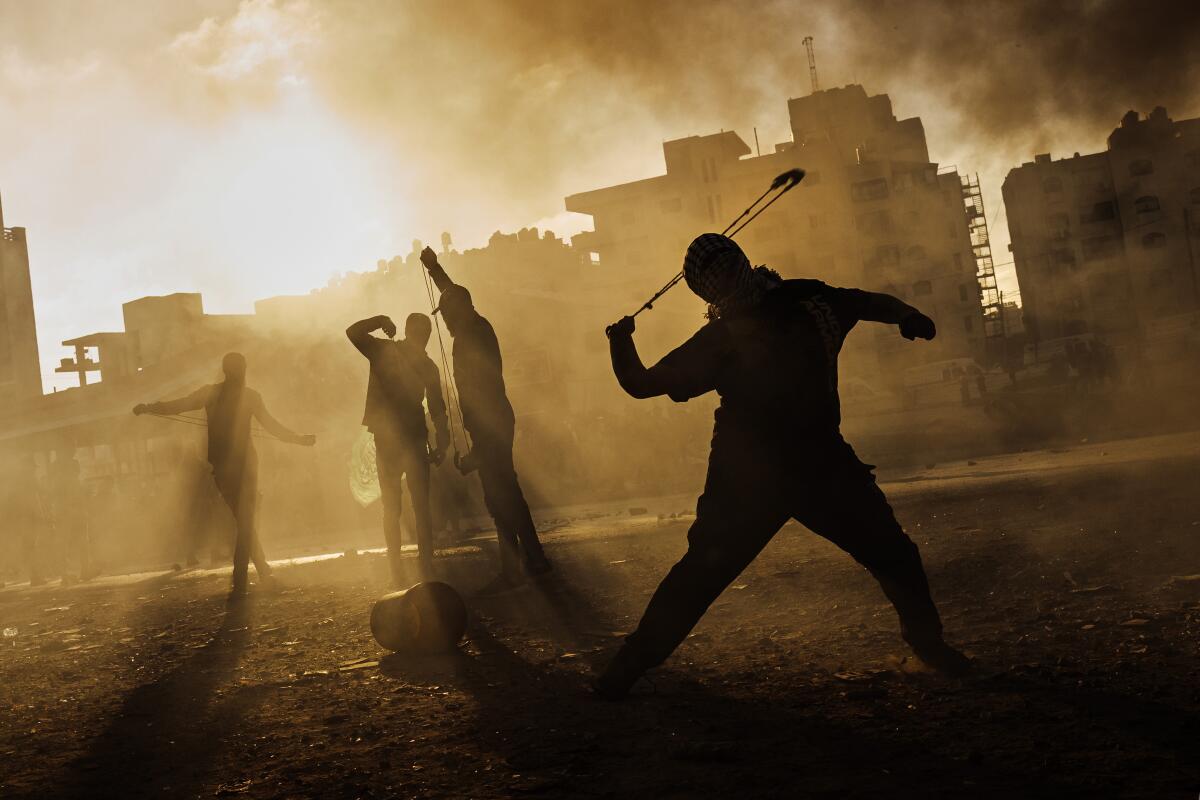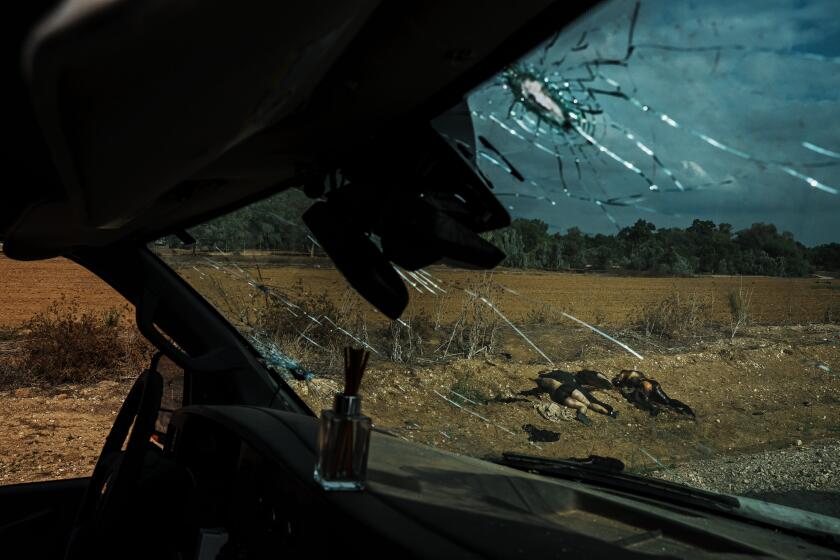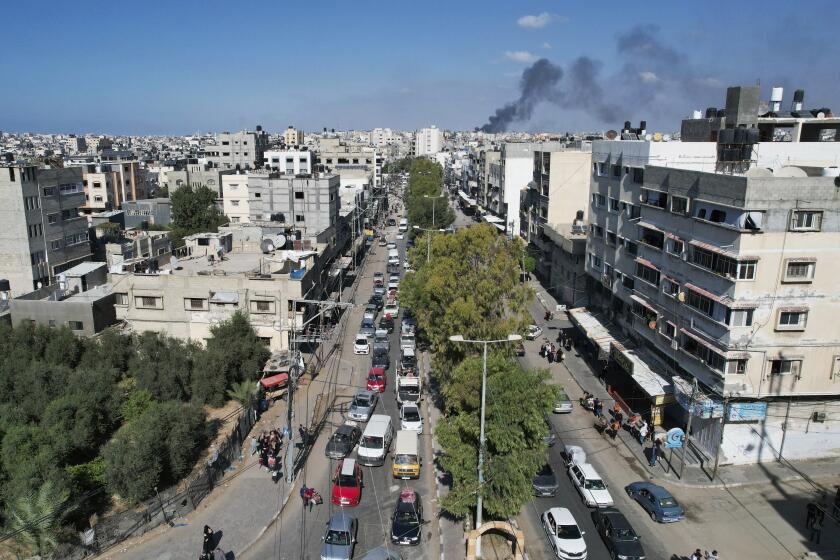Column: Israel’s goal in Gaza is regime change. Where have we heard that before?

- Share via
WASHINGTON — Ever since Hamas seized control of the Gaza Strip in 2007, Israel has waged an intermittent but limited military campaign to keep a lid on the violent Palestinian faction. Hamas fired missiles at Israeli cities, Israel bombed Gaza from the air or attacked on the ground, then negotiated a cease-fire.
The goal was never to remove Hamas; that appeared too costly. It was merely to keep it under control. Israeli military officers gave their recurring Gaza offensives a sad, cynical name: “mowing the grass.”
Last week, mowing the grass came to an end.
Hamas’ murderous rampage through Israeli towns and villages, which deliberately targeted civilians, led Israeli Prime Minister Benjamin Netanyahu to adopt a far more ambitious goal: regime change.
U.S. elected officials across the ideological spectrum have denounced Hamas’ killings of Israeli civilians and its taking of hostages, reflecting a surge in public support for Israel. A long war could change that.
“We will destroy Hamas,” Netanyahu said Friday.
“We are crushing Hamas’ ability to function as sovereign,” Daniel Hagari, a spokesman for Israel’s armed forces, told reporters. “We cannot continue to live with this rule.”
To remove Hamas from its hold on Gaza, Israel appears to be preparing a massive ground invasion. It has imposed a blockade, launched punishing airstrikes and urged more than a million Palestinian civilians to evacuate the northern third of the Gaza Strip.
Such an offensive would be difficult and costly. Hamas presumably knew its terrorist onslaught would provoke massive retaliation.
The group has spent years building fortified tunnels, preparing booby traps and training for house-to-house fighting. Former Israeli officers have estimated that dismantling Hamas’ military power could take between two and six months of fighting.
The campaign could cost the lives of thousands of combatants and thousands of civilians as well. Last week’s Israeli airstrikes killed an estimated 1,900 even before a ground offensive began. The United Nations warned that a massive, chaotic evacuation would have “devastating humanitarian consequences.”
As the Jewish Sabbath fell and Muslims marked their principal prayer day, Israelis and Palestinians struggled with the terrifying new reality after the militant group Hamas’ deadly attack on Israel.
But even if Israel succeeds in toppling Hamas, it will face a conundrum that Americans will recognize from the 2003 U.S.-led invasion of Iraq: Who will administer Gaza? Who will police the streets and ensure Hamas doesn’t rise again in an impoverished territory of people who have lost family and homes? The answer isn’t clear.
The problem with Gaza is that nobody seems to want it except Hamas.
Israel doesn’t want to occupy the territory; that’s why it left in 2005.
Egypt, which abuts the Gaza Strip to the south, doesn’t want it either.
Even the Palestinian Authority, which administers the Israeli-occupied West Bank and is led by longtime opponents of Hamas, may not want to take over — at least not right away, aboard Israeli tanks.
The PA is “the most natural address,” former Prime Minister Ehud Barak said last week in an appearance at the Carnegie Endowment for International Peace. “It doesn’t make sense to give [Gaza] back to Hamas.”
In a poll conducted in July for the Washington Institute on Near East Policy, 70% of Gaza residents said they would prefer to live under the PA than under Hamas.
Despite the likelihood that an Israeli invasion of Gaza could claim thousands of lives, some U.S. officials say Israel’s desire for revenge over Hamas attacks is justified.
But it’s not clear that the PA is up to the job. On the West Bank, the Palestinian Authority is widely regarded as inefficient and corrupt. Its leader, 87-year-old Mahmoud Abbas, hasn’t allowed elections for 17 years.
Critics of Netanyahu say the prime minister has deliberately weakened the PA by allowing Israeli settlements on the West Bank to expand, even as he quietly maintained a modus vivendi with Hamas in Gaza.
Barak and others have suggested that a post-Hamas order in Gaza might begin with an interim peacekeeping force provided by Egypt and other Arab countries.
“It would be a great blessing,” Barak said.
But that will require Israel to ask those countries, plus the United States and Saudi Arabia, for help brokering such an arrangement.
Some or all of the Arab countries involved would likely demand that Israel halt settlement expansion on the West Bank or make other concessions to the Palestinians as the price of their participation in a difficult and unrewarding mission.
All of which brings the issue back to where it started: the Israeli-Palestinian standoff, which has been gradually deteriorating for 15 years.
Israel’s strategy of mowing the lawn in Gaza didn’t just fail because Hamas is committed to the destruction of the Jewish state. It also failed because Hamas had a seemingly endless supply of potential recruits among young Gazans who saw no viable future.
When Secretary of State Antony J. Blinken met with Netanyahu last week, he reaffirmed the United States’ strong support for Israel’s right to self-defense. But he also reminded the prime minister that President Biden still believes Israel can achieve long-term security only if it seeks a viable peace with the Palestinians.
“We must provide an alternative to the vision of violence and fear, nihilism and terror presented by Hamas,” Blinken said.
Netanyahu didn’t respond. Israel’s focus, understandably, is on recovering from the trauma of the past week and preparing the military offensive to come. It’s far too soon to talk about a return to peace talks.
But it won’t be forever, especially if the alternative is endlessly mowing the grass.
More to Read
Get the L.A. Times Politics newsletter
Deeply reported insights into legislation, politics and policy from Sacramento, Washington and beyond. In your inbox twice per week.
You may occasionally receive promotional content from the Los Angeles Times.














